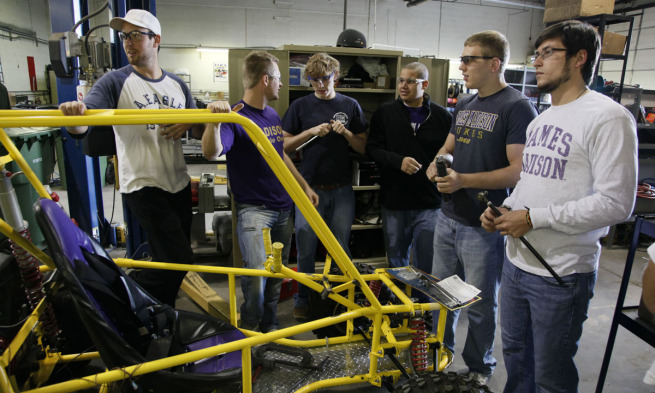Energizing the future
Being the Change
JMU's Alternative Fuel Program takes a creative approach to sustainability
By Martha Bell Graham
JMU's Alternative Fuel Program, one of many dynamic programs on campus working toward environmental sustainability, provides a framework of research in the area of transportation, says director and ISAT professor Chris Bachman. The program merges applied research with education and outreach, attacking the problem three ways: fuels, technology and the elusive human factor — perhaps the greatest challenge.Think of all 250 million cars on American highways right now. Next, think how to get every driver to stop, park and mount a bike, get into a small electric car or take a bus. You now have an idea of the task undertaken by professors and students in the College of Integrated Science and Technology's Alternative Fuel Program. It's a critical problem with complex solutions — and tough hurdles to overcome.
The JMU approach — cross-curricular and cooperative
The program's exploration of alternative fuels springs from many academic disciplines: biology, chemistry, geology, physics, engineering and technology. The cross-curricular and cooperative nature of the program makes it dynamic and fluid. Using surveys, simulation modeling, statistical analysis, along with hands-on research that emphasizes student participation, the program twines varied disciplines with many campus, community and government agencies — and students in all levels of education.
Investigating a variety of potential alternatives
Since 1997, JMU students and professors have worked together to explore the potential of harvested macrocystic pyrifera (giant sea kelp) and trichoderma reesei (a fungus) to produce biofuels. They have evaluated the efficacy of converting cooking oils leftover from the dining hall into biofuels and converted campus vehicles to run on it. They have investigated compressed natural gas as an alternative fuel. JMU now has two CNG refueling stations on campus and a fleet of vehicles using alternative fuels.
They also have explored electric and wind energy. Students are converting a truck donated by Shenandoah National Park, along with a $20,000 grant, to an electric vehicle the park service will use. It is one of several electric vehicles successfully developed in the university's Alternative Vehicle Lab where they take their ideas and build them. It is rare on college campuses for so many students to have access to a complete and professional machine shop, Bachman says.
The challenge to change human behavior
Innovative thinking, Bachman says, is why JMU's creative approach to the entire alternative fuels paradigm is so important. Anyone can build electric cars. The technology is there. But how do you get a majority of drivers to buy and drive them?
The best science — like a brilliant mind — is useless without the discipline of individuals to embrace it. Changing human behavior is the missing piece and is perhaps the biggest challenge AFP faces is changing the culture outside the university.
This point of interface is where AFP hopes to have an impact. Bachman puts it this way: "We're doing a different kind of research. ... How society interacts with technology. What are the hurdles to overcome to get them (environmentally smart vehicles) into the mainstream."
No matter how successful a program is, Bachman says, "none can meet current consumption, We have to use less energy. We have to shift our thinking." And that is perhaps the most challenging aspect of alternative fuel research — and the one where JMU is clearly taking a leading role.
"We're not like R1 schools," Bachman says. Plenty of schools and companies can create the technology, but JMU is working hard to change the perception and the acceptability of environmentally responsible vehicles. "It doesn't matter if you can create the most efficient vehicle on the road if people won't drive it." That's JMU's challenge and where AFP is making its mark.
At JMU the dynamic exchange and generation of innovative ideas is an unfettered and unmatched collaboration of professors, students, staff members, alumni and community members — all working toward a sustainable world.
Condensed from Summer 2009 Madison.
